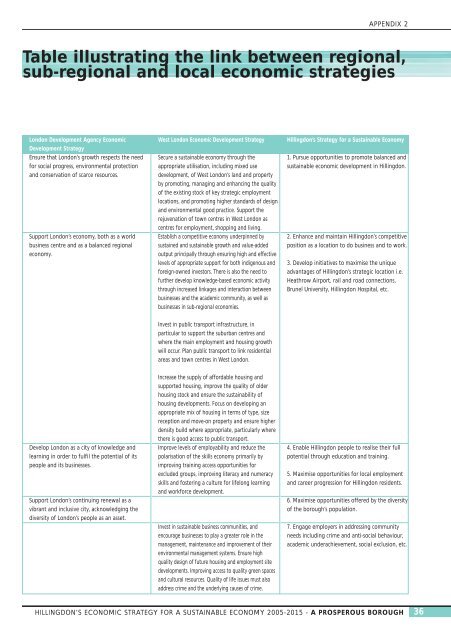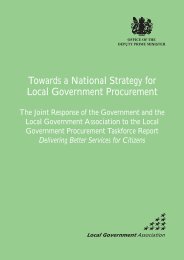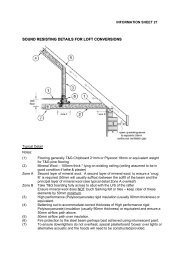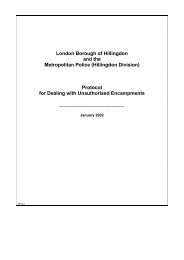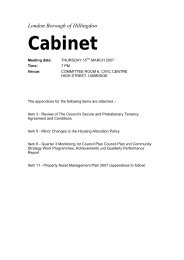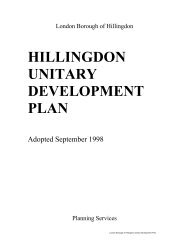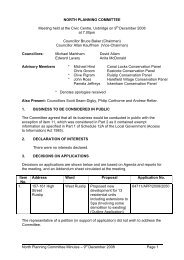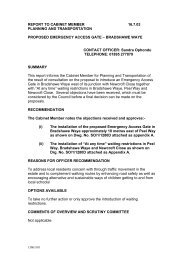Economic development strategy - London Borough of Hillingdon
Economic development strategy - London Borough of Hillingdon
Economic development strategy - London Borough of Hillingdon
Create successful ePaper yourself
Turn your PDF publications into a flip-book with our unique Google optimized e-Paper software.
APPENDIX 2<br />
Table illustrating the link between regional,<br />
sub-regional and local economic strategies<br />
<strong>London</strong> Development Agency <strong>Economic</strong><br />
Development Strategy<br />
Ensure that <strong>London</strong>’s growth respects the need<br />
for social progress, environmental protection<br />
and conservation <strong>of</strong> scarce resources.<br />
Support <strong>London</strong>’s economy, both as a world<br />
business centre and as a balanced regional<br />
economy.<br />
West <strong>London</strong> <strong>Economic</strong> Development Strategy<br />
Secure a sustainable economy through the<br />
appropriate utilisation, including mixed use<br />
<strong>development</strong>, <strong>of</strong> West <strong>London</strong>’s land and property<br />
by promoting, managing and enhancing the quality<br />
<strong>of</strong> the existing stock <strong>of</strong> key strategic employment<br />
locations, and promoting higher standards <strong>of</strong> design<br />
and environmental good practice. Support the<br />
rejuvenation <strong>of</strong> town centres in West <strong>London</strong> as<br />
centres for employment, shopping and living.<br />
Establish a competitive economy underpinned by<br />
sustained and sustainable growth and value-added<br />
output principally through ensuring high and effective<br />
levels <strong>of</strong> appropriate support for both indigenous and<br />
foreign-owned investors. There is also the need to<br />
further develop knowledge-based economic activity<br />
through increased linkages and interaction between<br />
businesses and the academic community, as well as<br />
businesses in sub-regional economies.<br />
<strong>Hillingdon</strong>’s Strategy for a Sustainable Economy<br />
1. Pursue opportunities to promote balanced and<br />
sustainable economic <strong>development</strong> in <strong>Hillingdon</strong>.<br />
2. Enhance and maintain <strong>Hillingdon</strong>’s competitive<br />
position as a location to do business and to work.<br />
3. Develop initiatives to maximise the unique<br />
advantages <strong>of</strong> <strong>Hillingdon</strong>’s strategic location i.e.<br />
Heathrow Airport, rail and road connections,<br />
Brunel University, <strong>Hillingdon</strong> Hospital, etc.<br />
Invest in public transport infrastructure, in<br />
particular to support the suburban centres and<br />
where the main employment and housing growth<br />
will occur. Plan public transport to link residential<br />
areas and town centres in West <strong>London</strong>.<br />
Develop <strong>London</strong> as a city <strong>of</strong> knowledge and<br />
learning in order to fulfil the potential <strong>of</strong> its<br />
people and its businesses.<br />
Support <strong>London</strong>’s continuing renewal as a<br />
vibrant and inclusive city, acknowledging the<br />
diversity <strong>of</strong> <strong>London</strong>’s people as an asset.<br />
Increase the supply <strong>of</strong> affordable housing and<br />
supported housing, improve the quality <strong>of</strong> older<br />
housing stock and ensure the sustainability <strong>of</strong><br />
housing <strong>development</strong>s. Focus on developing an<br />
appropriate mix <strong>of</strong> housing in terms <strong>of</strong> type, size<br />
reception and move-on property and ensure higher<br />
density build where appropriate, particularly where<br />
there is good access to public transport.<br />
Improve levels <strong>of</strong> employability and reduce the<br />
polarisation <strong>of</strong> the skills economy primarily by<br />
improving training access opportunities for<br />
excluded groups, improving literacy and numeracy<br />
skills and fostering a culture for lifelong learning<br />
and workforce <strong>development</strong>.<br />
Invest in sustainable business communities, and<br />
encourage businesses to play a greater role in the<br />
management, maintenance and improvement <strong>of</strong> their<br />
environmental management systems. Ensure high<br />
quality design <strong>of</strong> future housing and employment site<br />
<strong>development</strong>s. Improving access to quality green spaces<br />
and cultural resources. Quality <strong>of</strong> life issues must also<br />
address crime and the underlying causes <strong>of</strong> crime.<br />
4. Enable <strong>Hillingdon</strong> people to realise their full<br />
potential through education and training.<br />
5. Maximise opportunities for local employment<br />
and career progression for <strong>Hillingdon</strong> residents.<br />
6. Maximise opportunities <strong>of</strong>fered by the diversity<br />
<strong>of</strong> the borough’s population.<br />
7. Engage employers in addressing community<br />
needs including crime and anti-social behaviour,<br />
academic underachievement, social exclusion, etc.<br />
HILLINGDON’S ECONOMIC STRATEGY FOR A SUSTAINABLE ECONOMY 2005-2015 - A PROSPEROUS BOROUGH<br />
36


